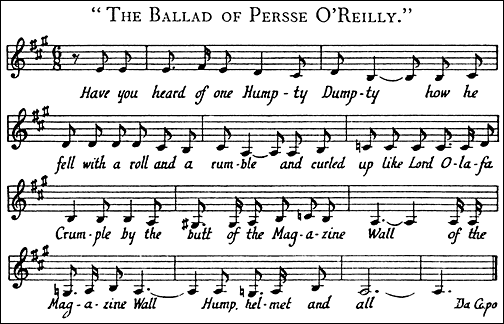

Los Doggies envisions Finnegans Wake as a Rock Opera. Mátyás Seiber, Hungarian composer, wrote two (sadly, unrecorded) pieces taking Joyce as inspiration: "Ulysses" (based on the "Ithaca" episode) and "Three Fragments from A Portrait of the Artist as a Young Man". The American premiere performance of Ulysses took place at Carnegie Hall this year, in October. Mason Jennings sings about Ulysses: "I went into twelve bookstores looking for Ulysses..." (Is he Hugh Kenner? I must say, I have never found obtaining a copy this difficult! Anyway, he continues, "Now I have it here sitting on the table." Phew!) It's actually a nice song and can be heard here. Basically, music is so often based on Joyce's works that websites devote themselves to the subject.
But there are two musical Joyce projects going on right now that show how his works are still being used as artistic inspiration:
The James Joyce Quarterly blog (yes it's true! don't you wish all the academic journals you ever poured over had started writing awesome blogs?) recently wrote about the band Minus 3, who just recorded an album based on Ulysses. The album is titled North Strand, referencing Stephen's walk on the strand in the "Proteus" episode, and includes a track titled "Adiaphane" (opaque), referencing one of Stephen's topics of musing on this walk: "Limit of the diaphane in. Why in? Diaphane, adiaphane. If you can put your five fingers through it, it is a gate, if not a door. Shut your eyes and see."
Another track, titled "Yes", is a more common Joyce reference - the first and last word of Molly's monologue (and therefore the last word of the novel):
Another Joyce music project is the band Boston Spaceships' latest album Our Cubehouse Still Rocks. Their title a line taken from Finnegans Wake:
"Freedom Rings", a track from their new album:
But there are two musical Joyce projects going on right now that show how his works are still being used as artistic inspiration:
The James Joyce Quarterly blog (yes it's true! don't you wish all the academic journals you ever poured over had started writing awesome blogs?) recently wrote about the band Minus 3, who just recorded an album based on Ulysses. The album is titled North Strand, referencing Stephen's walk on the strand in the "Proteus" episode, and includes a track titled "Adiaphane" (opaque), referencing one of Stephen's topics of musing on this walk: "Limit of the diaphane in. Why in? Diaphane, adiaphane. If you can put your five fingers through it, it is a gate, if not a door. Shut your eyes and see."
Another track, titled "Yes", is a more common Joyce reference - the first and last word of Molly's monologue (and therefore the last word of the novel):
"...I was a Flower of the mountain yes when I put the rose in my hair like the Andalusian girls used or shall I wear a red yes and how he kissed me under the Moorish wall and I thought well as well him as another and then I asked him with my eyes to ask again yes and then he asked me would I yes to say yes my mountain flower and first I put my arms around him yes and drew him down to me so he could feel my breasts all perfume yes and his heart was going like mad and yes I said yes I will Yes."Throughout the song you can faintly hear a woman's singsong voice, but if you listen carefully, she the words are actually from "Finnegan's Wake".
Another Joyce music project is the band Boston Spaceships' latest album Our Cubehouse Still Rocks. Their title a line taken from Finnegans Wake:
What then agentlike brought about that tragoady thundersday this municipal sin business? Our cubehouse still rocks as earwitness to the thunder of his arafatas but we hear also through successive ages that shebby choruysh of unkalified muzzlenimiissilehims that would blackguardise the whitestone ever hurtleturtled out of heaven. (p. 5)Boston Spaceships is composed of two musicians from Guided by Voices and John Moen from The Decemberists (known for using awesome words in their songs), so I'm not surprised to see this group interacting with Joyce in this way.
"Freedom Rings", a track from their new album:
I'm happy to hear sung recordings of Chamber Music (that's a lie - I'm often bored and/or horrified), but what I most appreciate is when musicians take Joyce as an inspiration, find a small part of him or his works that speaks to what they are trying to do in their own art, and then give him back to us as something new. And it's groups like Minus 3 and Boston Spaceships that really get this. For my profound closing line, I'm actually going to quote a YouTube comment: "James Joyce would be wicked pumped". I have to agree, skogmonkey.

Finnegan's Wake as a rock opera: I love that idea, better than the Wagner version I have in my head.
ReplyDeleteAgreed! That was secretly my favourite of all the Joyce-related music finds.
ReplyDeleteAlso, your blog is excellent and I'm thoroughly enjoying reading through some past entries!